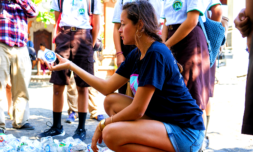Kasha Sequoia Slavner is an award-winning filmmaker and director who made a splash in the industry with her 2017 social change film ‘The Sunrise Storyteller’. We discussed her work and future ambitions, as well as her take on the changing landscape of cinema.
If you’re an indie film savvy you may have already heard of Kasha Sequoia Slavner, a 22-year-old director, screenwriter, and founder of The Global Sunrise Project.
Her first film, a social change documentary titled ‘The Sunrise Storyteller’, premiered at the United Nations Commission on the Status of Women in 2017. It’s bagged 29 awards and has been screened at 60 film festivals internationally since its release, and Kasha herself has been a social justice advocate for over a decade.
Her own social change initiative, The Global Sunrise Project, brings together stories of innovation and perseverance from around the world, offering educational resources to Gen Zers eager to make a positive impact and get clued up on the climate crisis.
Kasha was generous enough to give us an hour of her time via a long-distance Zoom call recently to chat all about her work, including her ambitious goals for social justice, how she first got started, her take on the future of cinema and film, as well as her new upcoming documentary, ‘1.5 Degrees of Peace.’
You’ll be inspired to pick up a camera and get creating your own projects before too long, and Kasha was hugely supportive of any and all inspiring filmmakers wanting to make a splash in the indie scene.
Read on to hear all about her story – and we’ll see you on Zoom at the next digital film festival.
The Global Sunrise Project and finding a passion for film
First on the agenda was Kasha’s 2017 film ‘The Sunrise Storyteller’ and her early beginnings. I was interested to learn about how she found her passion for film and visual storytelling.
‘I was 15 when I first came up with the idea for a documentary. Coming from a single parent household, we didn’t have the money to just make a film and travel. I had to learn everything I could on the go by myself.’
https://www.youtube.com/watch?v=hvRPbP-SUow
For those unfamiliar, ‘The Sunrise Storyteller’ follows Kasha across the globe as she meets unique individuals from a diverse range of backgrounds, learning all about their innovative solutions to pressing issues caused largely by the climate crisis. She wanted the film to resonate and encourage others to get involved in humanitarian problems.
She raised money for the project via crowdfunding campaigns, though it took a while to get initial support. ‘People looked at me as a fifteen year old and thought it was a cute idea, but that I couldn’t be serious about it until I was older.’
‘I continued to put the work in and I got together my first crowdsourcing campaign before we left. I did two more on the road when we were travelling – we were very resourceful and determined to get the film done.’
Kasha says overall reception to the finished product has been largely positive. ‘People love the film, they’ve felt inspired by it, which is ultimately what I set out to achieve.’ Her persistence to make it a reality helped to fuel its momentum, both in content and production.
‘I think my own personal journey of resilience is similar to the narrative arc of the film.’ That is to say that wherever there is a will, there is a way, regardless of the odds.
























